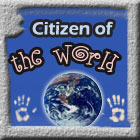Tired of problems without solutions? Do you want to help, but don't know what to do? Are you frustrated by everyone blaming problems on the government or corporations without proposing answers?
I want to try the opposite. I would like to propose some simple changes you can make in your life. Then I'll explain how these simple changes can improve you, your community, and your world. Changing the world is daunting and near impossible, but making small changes in our daily lives is quite manageable.
Do you want to fight the power, to stick it to the man? Do you hope to change politics and economics? Are you trying to rebel against corporations? Are you tired of being sick and sick of being tired? Do you want to really improve the world for your children? Starting, any or all of these, is simple. As simple as:
- Buy local & organic...
- Cook your food...
- Find alternatives to driving...
If you drink coffee then buying fair-trade organic coffee is the first place to start. Commercial coffee is one of the single most dangerous crops in the world. The pollution it causes, due to chemicals and treating, is staggering. Coffee is responsible for a lot of rainforest destruction and a lot of economic misery. The children of coffee farmers often die of malnutrition. Foreign corporations control how farmers farm, where planting just a few food crops, into the same precious soil, could save their families. Making different choices breaks the chain of corporate greed, hurts unjust governments, and improves the lives of farmers (and their children) around the world.
Cooking is a tradition most of us have lost. But thankfully not too long ago. There are probably still a few pots and pans hidden away in your kitchen. Learning to cook is easy and fun. It can bring families closer together, make meal times more social, and of course cooking all that wholesome locally grown organic food will make you healthier. What's the catch?
Sorry to say, for most of us, the catch to "cooking" means giving up fast food and canned drinks. This is harder for some than for others, but truly critical. Rainforest destruction, health issues with processed and frozen foods, corporate abuses, unfair marketing to children, constant cavities; all these can be avoided just by cooking your own food. And this will improve your happiness too. The preparation time, the family sharing, the connection it builds between you and your food, and the improved health that comes from eating real food; all these go into making you feel better and happier. And, the rebelious act of cooking your own food pulls control of your life out of the hands of others and gives it back to you. Cooking is so much more than changing food. It can change the world.
I grew up in a North American subburb where it felt like life didn't really begin until you could drive. Sure, as 15 year olds we would ride our bikes to the mall, but not as 17 year olds. As an adult, I recall leaving the office with coworkers to go for dinner, where 5 people got in 5 cars, drove across the road and parked. Clearly walking the short distance was preferable.
Your physical abilities are a "use it or loose it" proposition. Don't take little walks, and later you won't be able to. So start thinking of ways you can move your body. And start to bike, and use the bus. Chances are the buses in your locality go "downtown", to where the smaller (local) shops and business are. Take the bus to the farmers market and get to know the butcher, the baker, and the bus fare taker.
Use alternative transportation and you change the world. You change the need to import oil from war-torn regions far away. You change the controls that corporations and energy companies have over you. You pollute less, move your body more, spend some time outdoors and feel happier and healthier for these experiences. When you look at your daily routines, ask yourself which trips you could make better, but making them without the car.
Lower your stress, stop war, live longer, help children in poor countries, improve your heart and reduce your risk of cancer, reduce pollution to your drinking water and stop corporations from taking control of your life... the list goes on and on. There are lots and lots of problems in the world, and you can begin to fight many of them by making a few small changes at home. You benefit, I benefit, the whole world benefits when we all start working together.
So I invite you, I beg you, let's rebel. Let's start a new way of thinking and acting. Let us simply choose to eat better food, to cook what we eat, and to consider whether or not you need to drive. Once begun, these changes feedback on themselves. Feeling healthier makes you want better food and to move more. Eating better and moving more make you feel healthier. The cycle spreads outwards and helps others. And starting is as simple as: buy local and organic foods, cook them yourself, and find other ways to travel.

